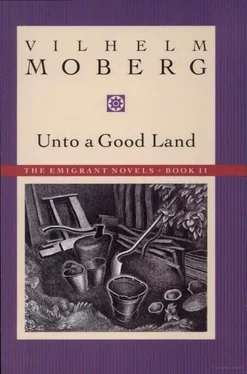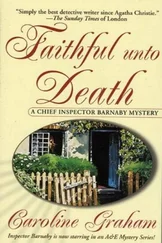“He was a dangerous man,” said Arvid, still shaking. “He might have killed us!”
In a flash Robert could see himself and Arvid lying there stretched out in the street, knife slashes through their throats, like pigs at slaughter time, their blood gushing like ale through a bunghole; their legs kicking a last, weak kick, a helpless kick against death; a feeble twitch of their limbs — then death overpowering them. And there they would be lying, dead in the street, people walking by, no one noticing or taking care of their corpses, nor shrouding them, nor burying them, nor grieving over them here in a foreign country. And when they began to rot and smell, they would at last become food for the swine in the street. So it might have happened.
Robert had seen something glitter in the man’s hand but now, as he recovered his breath, he thought it might not have been a knife; it looked more like glass, perhaps a small bottle. But Arvid insisted he had seen the gruesome man pull out a slaughter knife, a real sticking knife with a point as sharp as an awl.
Robert was still trembling a little, and now he felt ashamed of it and wondered if they hadn’t run simply because of their own fear. He told Arvid they must agree never to let fear overtake them here in America.
“Silly to run away! If the man had touched us, we could have reported him to the police.”
He had just remembered from his English instruction book how to call the police in case of robbers and murderers on the street: Please listen to me, Mr. Policeman! I appeal for your protection against this unfriendly person who is annoying me. This was a long sentence, requiring much time to say. . He thought one would have to be very quick if one were to finish the whole sentence before being murdered. He realized he must learn English as soon as possible; he must know the language in order to save his life in case of sudden attack, if for no other reason. He had forgotten, earlier, that he had something of value he might lose; now he remembered: his own life!
But what had happened was really Arvid’s fault: “I told you to let the man alone!”
“I thought he was dead from drinking. He stank of brännvin.”
“But why did you poke him in the ribs?”
“I like the smell of brännvin, and I thought a corpse couldn’t be dangerous.”
Robert lectured him. He had been foolish and curious, and as a result almost got them killed. Finally Arvid agreed that he had been careless; but he had felt happy and reckless today, walking along this broad, beautiful street. Now he became dejected and sad; he promised on oath, using God’s holy name, that it would never happen again. If he found droves of corpses here in America, if people lay dead in piles on every street and road, he would never bother to stop. No, he wouldn’t even cast a glance at a single one of the corpses, no one could ever persuade him to look at dead men, or poke at them — even if they smelled of brännvin ever so much. He and Robert shook hands on this.
They were a little disappointed not to have reached the farther end of the street, not to have seen where Broadway ran — either to the portals of Heaven or Hell. But now they trailed dejectedly and cautiously back to its beginning, where they had started out, near the green grove, the manor park. They went back to join their families, both of them anxious to tell the others about their walk on the most beautiful street in the world, where they had almost been robbed of the only thing they owned — their lives.
Arvid soon consoled himself, and his happiness returned as he stuck his hand into his trousers pocket and felt his watch still there.
VI. JOURNEY WITH THE STEAM WAGON
Contract for Transportation of Immigrants
The undersigned agrees to carry the immigrants, who have arrived on the Swedish brig Charlotta of Karlshamn, from New York to Chicago, on the following conditions:
1. From New York to Albany by steamer, from Albany to Buffalo by steam wagon, and from Buffalo to Chicago by steamer.
2. For every adult person the fare is 8 dollars, children under 3 years free, children between 3 years and 12 years half fare.
3. The same fare entitles the traveler to 100 lbs. baggage free, and 150 lbs. on the steam wagon.
4. The baggage of the passengers is transferred free of charge from the vessel in New York to the steamer, and likewise in Albany and Buffalo, the whole way through to Chicago.
New York, June 26, 1850
— 1—
The immigrants traveled up the Hudson from New York to Albany on one of the largest steamboats plying the river, the Isaac Newton.
The steamer left New York at eight in the evening, loaded to capacity with passengers and baggage. The immigrants were crowded together on the lower deck, while their belongings were piled almost as high as the smokestacks of the steamer on the upper deck toward the bow.
This was a night without rest for the travelers; there were no sleeping accommodations, and the immigrants sat or stood on deck, so closely packed together that no one could lie down. Parents held their children in their arms, older children and grownups stood upright. When they were tired, they tried to find rest by leaning on each other. Fortunately, they were to travel on this boat for only one night.
And this night they might have been able to sleep without concern for their lives if only there had been room to stretch out; this was not a dangerous voyage over a heaving ocean, violently pitching and rolling; this was a steady, easy passage on a calm, protected river. The Hudson stretched serenely before them, dotted with islands and inlets, following its furrow in quiet power. Through the night, mist towered over the high, steep shores. They were like secret dark fortress walls or silent sentinels, which guarded their water passage on either side. The journey on this water, where they could see land on the right and on the left, was to these ocean travelers almost the same as a trip on solid ground.
The Isaac Newton was driven forward by its great stern wheel, which dug deep into the river, stirring up whirls of foam; the wheel twirled the water like a giant egg whisk. The Hudson’s even current slowed the progress of the heavily laden, deep-lying vessel. The stern wheel cut a deep furrow through the white foam, a wheel track in the water, evened out, obliterated, and gone as soon as its wake had passed. Behind the vessel the river flowed as before, calm, slow, even, majestic, on its way to the Atlantic.
One hour after daybreak the Isaac Newton tied up at the pier in Albany. Tired, limp, worn-out by lack of sleep, the immigrants left the boat and were divided into groups by their guides and interpreters, who marched with them on a road along the river to the railway station. They were shown into a large hall in the station house, and here the different groups — the English, the Irish, the Germans, the Swedes — were told by their respective guides in their own languages to remain absolutely still; no one was allowed to move from his indicated place. They were not told why they must stand so still, but gradually they learned: two American inspectors went about among them, pointing their fingers at each one, counting them. The men came back, pointed and mumbled once more, and again the immigrants were told by their guides to remain absolutely still; a few had moved and confused the inspectors in their counting.
The immigrants were counted like sheep in a pen, their numbers must check with the numbers in the passenger contracts. Then they were let out of the station to board the steam wagon.
— 2—
At home, the immigrants from Ljuder had heard stories about these newly invented wagons, which were driven by steam and rolled along on iron bars strung over the ground. But until now none of their group had seen or used the railroad. To them this newfangled method of transportation seemed dangerous, possibly disastrous. But Karl Oskar had said that the steam wagon was the fastest means of transportation inland, and as their interpreter had told them the same, they had agreed to try the new way of traveling.
Читать дальше










